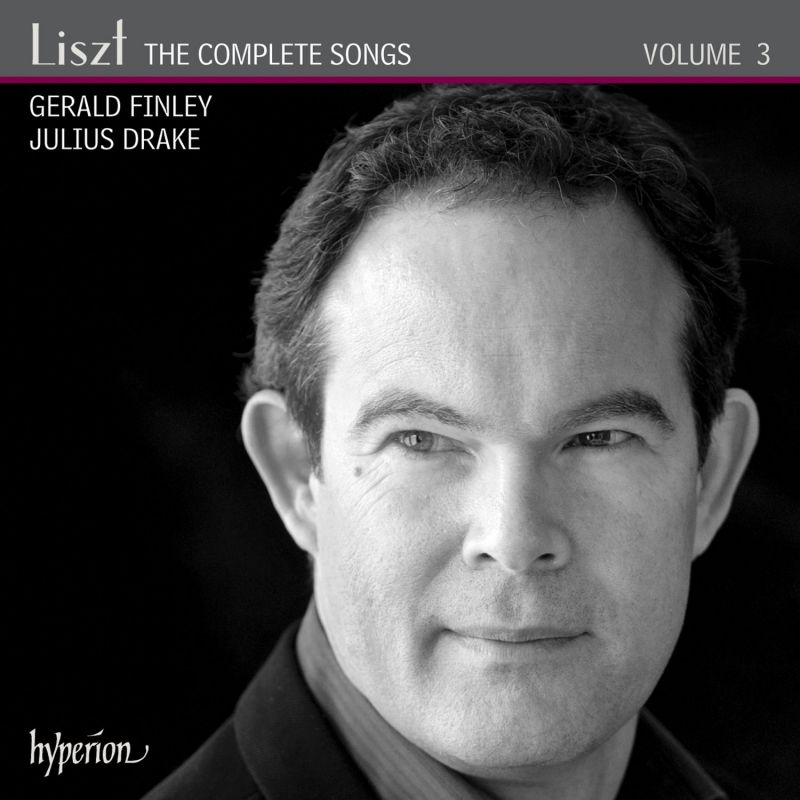LISZT Complete Songs Vol 3
View record and artist detailsRecord and Artist Details
Composer or Director: Franz Liszt
Genre:
Vocal
Label: Hyperion
Magazine Review Date: 04/2015
Media Format: CD or Download
Media Runtime: 71
Mastering:
DDD
Catalogue Number: CDA67956

Tracks:
| Composition | Artist Credit |
|---|---|
| Morgens steh' ich auf und frage |
Franz Liszt, Composer
Franz Liszt, Composer Gerald Finley, Bass-baritone Julius Drake, Piano |
| (Ein) Fichtenbaum steht einsam |
Franz Liszt, Composer
Franz Liszt, Composer Gerald Finley, Bass-baritone Julius Drake, Piano |
| Anfangs wollt' ich fast verzagen |
Franz Liszt, Composer
Franz Liszt, Composer Gerald Finley, Bass-baritone Julius Drake, Piano |
| Weimars Toten |
Franz Liszt, Composer
Franz Liszt, Composer Gerald Finley, Bass-baritone Julius Drake, Piano |
| Wer nie sein Brot mit Tränen ass |
Franz Liszt, Composer
Franz Liszt, Composer Gerald Finley, Bass-baritone Julius Drake, Piano |
| (3) Sonetti di Petrarca |
Franz Liszt, Composer
Franz Liszt, Composer Gerald Finley, Bass-baritone Julius Drake, Piano |
| (Die) Fischerstochter |
Franz Liszt, Composer
Franz Liszt, Composer Gerald Finley, Bass-baritone Julius Drake, Piano |
| Und wir dachten der Toten |
Franz Liszt, Composer
Franz Liszt, Composer Gerald Finley, Bass-baritone Julius Drake, Piano |
| (Die) Vätergruft |
Franz Liszt, Composer
Franz Liszt, Composer Gerald Finley, Bass-baritone Julius Drake, Piano |
| Gastibelza |
Franz Liszt, Composer
Franz Liszt, Composer Gerald Finley, Bass-baritone Julius Drake, Piano |
| (La) Tombe et la rose |
Franz Liszt, Composer
Franz Liszt, Composer Gerald Finley, Bass-baritone Julius Drake, Piano |
| (Le) Vieux vagabond |
Franz Liszt, Composer
Franz Liszt, Composer Gerald Finley, Bass-baritone Julius Drake, Piano |
| Go not, happy day |
Franz Liszt, Composer
Franz Liszt, Composer Gerald Finley, Bass-baritone Julius Drake, Piano |
Author: Richard Wigmore
The ever-rewarding song partnership of Gerald Finley and Julius Drake are persuasive advocates across the whole spectrum of Lisztian styles. Where theatrical panache is a sine qua non – in the swaggering ‘Gastibelza’ or the melodramatic ballad ‘Die Fischerstochter’ – the pair provide it in spades. Finley’s darkly mellow, scrupulously produced baritone has the reserves of power to make something noble of the potentially bombastic ‘Weimars Toten’, while here and elsewhere Drake is a vivid colourist.
Always specific in his responses to verbal sonority and meaning, Finley graphically captures the shades of irony and bitterness in another ballad, ‘Le vieux vagabond’, encompassing with ease its huge vocal range, down to a resonant low E. His mellifluous legato, ardent phrasing and ringing top notes are well displayed in the soaring Italianate lines of the Petrarch sonnets. Drawing on the bass resonances within his baritone, Finley brings a baleful authority to the half-crazed old Harper’s song ‘Wer nie sein Brot mit Tränen ass’, whose obfuscating chromaticism sounds even stranger than Wolf’s setting of 30 years later; and singer and pianist sensitively catch the mix of confiding intimacy and austerity in three epigrammatic settings of Heine, the composer’s one-time friend who coined the term Lisztomania. Except in the Petrarch songs, Liszt rarely seduces you with ravishing melody. But, as Finley and Drake eloquently demonstrate (a word, too, for Susan Youens’s absorbing booklet-notes), his songs are never less than fascinating, harmonically, pianistically and in their often original approach to word-setting.
Discover the world's largest classical music catalogue with Presto Music.

Gramophone Digital Club
- Digital Edition
- Digital Archive
- Reviews Database
- Full website access
From £8.75 / month
Subscribe
Gramophone Full Club
- Print Edition
- Digital Edition
- Digital Archive
- Reviews Database
- Full website access
From £11.00 / month
Subscribe
If you are a library, university or other organisation that would be interested in an institutional subscription to Gramophone please click here for further information.




